There are distinct advantages to buying reptiles directly from the source, if you go about it the right way.
Geckos, ball pythons, ackies, tortoises and their cold-blooded brethren don’t just magically appear in terrariums overnight. Someone somewhere had to breed them, and that someone may be worth getting to know and trust if you want to obtain the healthiest and most distinctive pet reptiles.
Of the 11.5 million reptile pets that reside within 5.6 million U.S. households (based on numbers provided by the American Pet Products Association), the vast majority are purchased from pet stores.
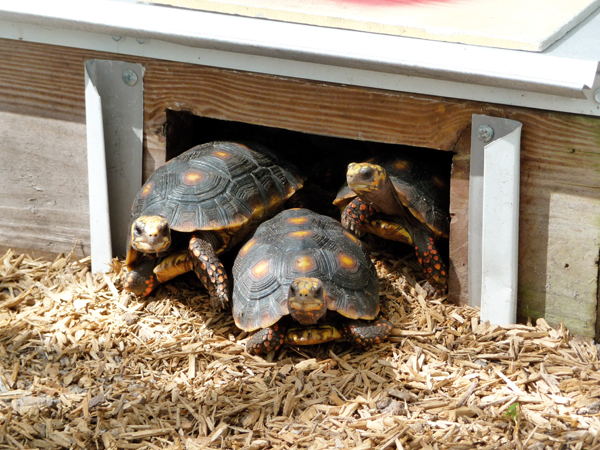
Russ case
Often, the hardiest and most colorful herps can be obtained directly from a breeder.
But unless a retailer is one that breeds its own animals for sale, chances are that the livestock was either purchased from outside breeders, which are in plentiful supply these days, or imported, which can often result in stressed animals. For that latter reason, purchasing captive-bred animals is always your best choice.
It’s estimated that there are as many as 10,000 reptile-breeding businesses in the United States that potentially earn more than $180 million per year, according to data published by the consulting firm Georgetown Economic Services LLC (GES). And like the species they produce, reptile breeders come in a variety of types and sizes:
- Mass producers who focus their business on providing large quantities of animals to pet retailers and chain stores with which they have supply agreements, or to retail distributors. Mass producers, which are relatively few in number, rarely sell directly to private pet owners.
- Large-scale breeders who also produce high numbers of reptiles but focus on higher-quality “designer” pets and rarer morphs that are supplied to pet stores and/or are shipped to individual owners around the world. It’s estimated that there are only about a dozen or so large-scale breeders operating in America today.
- Small-scale breeders, numbering in the hundreds nationwide, who typically concentrate on breeding morphs that have already been produced but which can still be somewhat rare.
- Part-time breeders and hobbyists who often run solo operations in their own homes but usually work in other fields, treating reptile breeding as a source of supplemental income. Breeders in this category number in the thousands.
Purchasing From the Source
They say if you want the best apple, pick it fresh from the tree—an adage that can also apply to reptiles. Often, the heartiest and most colorful herps can be obtained directly from a breeder.
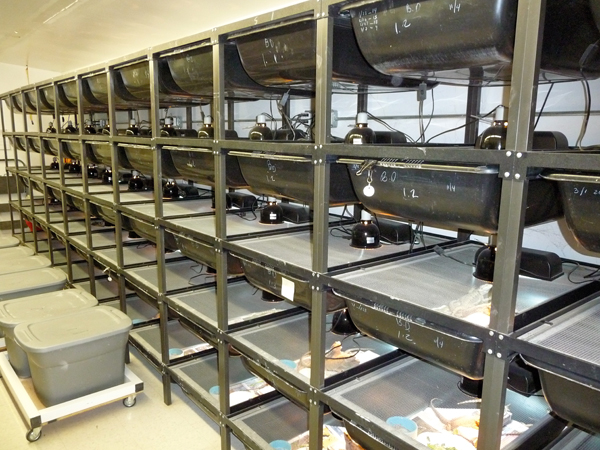
russ case
A rack system at a breeding facility.
The advantages of cutting out the retailer middleman and dealing directly with a breeder include a wider range of animals to choose from and the ability to contact a trusted individual source if you have questions or concerns later, according to John Mack, CEO of Reptiles by Mack, a Xenia, Ohio-based large-scale reptile breeder that produces many species, including colubrids, veiled chameleons and pythons.
“Individual breeders may also have background experience with a given specific animal, knowing that animal’s history and health, perhaps more thoroughly than a pet store,” says Mack. “It’s simply not feasible for most pet stores to offer the same range of reptiles than private breeders who can focus on specific species, breeds and morphs. The more exotic the species, the more likely you’ll need to approach a private breeder.”
Brian Gundy, the owner of For Goodness Snakes, a small breeding operation in San Jose, Calif., that produces up to 150 reptiles per year, says what distinguishes him from the competition are the colorful morphs he’s known for creating, particularly selectively bred snakes with eye-catching dorsal striping.
“When I breed, I’m trying to produce the highest quality animals I can,” he says, “not necessarily for my customers, but also so I can breed those animals later. I want a certain color combination and random pattern for my snakes—the type of quality that you usually don’t get from a pet shop.”
Gundy, who has created more than 350 YouTube educational videos for snake owners, says pet retailers often aren’t willing to pay for high-quality morphs and breeds, so his biggest customers are other breeders as well as individual owners who value quality and responsible husbandry over the lowest price.
Pet-Owner Preferred
Christopher Chu of Plainfield, N.J., who purchases reptiles from various breeders spread over multiple states, says he prefers to go breeder-direct for many reasons.
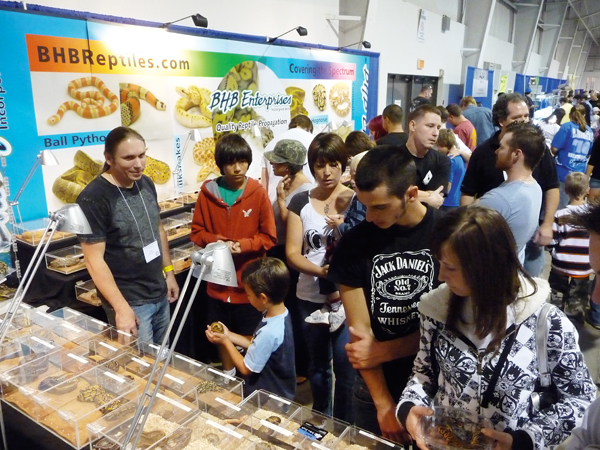
russ case
Reptile breeders are more knowledgeable about their animals.
“It allows you to ask questions about the animal’s bloodline and husbandry. Knowing the reptile’s lineage is important to me. Unless you go with a very specialized pet retailer, you won’t get the level of intimate knowledge about your pet that you would with a breeder,” says Chu.
Indeed, reputable breeders who are committed to their craft tend to build strong fan followings and loyal clientele. Case in point: Henry Barker, who fondly remembers regular childhood visits to The Serpentarium, a museum/retailer/breeder in Lodi, Calif., Barker’s hometown. Barker has been giving The Serpentarium his exclusive business for more than 23 years; most recently, he purchased a pair of bearded dragon morphs for his two young daughters.
“I like dealing with small breeders because they’re more knowledgeable about the reptiles they’re producing and selling. They can help with complete setups and tell you about your species’ temperaments, preferred cages and all the little details you need to know,” says Barker.
Breeders tend to know a lot about the species they breed, so they often can supply more information than a typical pet store clerk, according to Byron J. S. de la Navarre, DVM, a Chicago-based past president of the Association of Reptilian and Amphibian Veterinarians (ARAV).
Not Always Perfect
Don’t be too quick to put private breeders on a pedestal and write off all pet shops as less-than-worthwhile sources of well-bred herps, however. According to Austin Harris, the manager at Underground Reptiles, a pet retailer in Deerfield Beach, Fla., some retailers, including his store, which breeds tegu morphs, blue-tongued skinks, rhino iguanas and other exotics, reproduce their own livestock on or off site and offer good quality and responsive service.
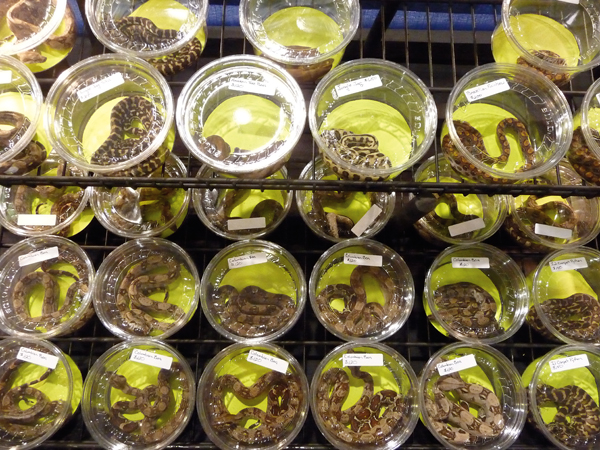
russ case
Reptile shows are great places to acquire pets, and talk to the breeders who have taken care of them since before birth.
“Most breeders I know actually won’t take your daily questions about husbandry, setup and problems,” says Harris. “We get calls every day about care and maintenance and are willing to spend the time necessary to answer all of them. You’re going to have to purchase dry goods from a (retail store) anyway, so if your local pet store has the animal you want along with the supplies you need, you might get a better value.”
Mack, too, says dealing directly with a breeder can have some disadvantages, including issues related to accessibility, availability and a breeder’s capability to safely ship animals to distant clients. “Payment options and warranties can also be an issue,” he adds, “based on the breeder’s size and ability to handle orders.”
Not all breeders can be trusted, either. Max Schad, a game warden with the California Department of Fish and Wildlife in San Jose, Calif., owns several ball pythons and says he once ordered a snake from a breeder on the other side of the country, and it arrived with blisters and died a short time later.
“The breeder was difficult at best to work with,” Schad says. “It’s worth it to pay a few dollars more to deal with someone locally who may have higher costs associated with keeping and breeding (reptiles) than a high-volume breeder or pet store.”
Cost Considerations
Many reptile lovers who purchase straight from a breeder can likely expect to pay more than if they had bought a comparable animal from a pet store, but not always.
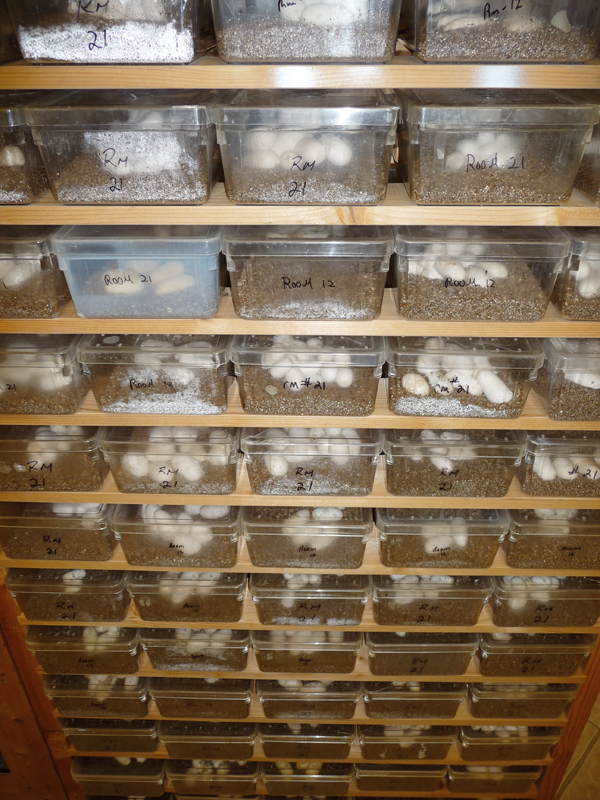
russ case
A rack system used by breeders.
Unlike most pet retailers, breeders often don’t have to deal with large overhead costs, such as paying employees and leasing space, that leads to higher markups on animals for sale. Some breeders also will sell a reptile cheaper than expected to undercut their competition. “I might sell a snake to a pet shop for $15 to $20 that that store will charge a customer $150 for,” says Gundy.
On the other hand, because they deal in rarer morphs that require a serious investment of dollars and time and don’t enjoy the economies of scale that, for example, a chain store might, breeders often charge more for a given species than a pet retailer would. “Reptile cost is almost always breed specific. For more common animals, pet stores often are able to offer lower prices, even combining equipment in the animal’s ‘sticker price,’” says Mack.
“Remember,” says Robert Coral, CEO/President of The Serpentarium, Inc., “you almost always get what you pay for, no matter who you buy from. And you should never make a decision based on price alone.”
Invest the Time
Whether you’re looking to purchase from a hobbyist breeder, a larger-scale professional reptile breeder or a mom-and-pop pet shop that breeds its own animals, locating the ideal source means doing your homework.
“A prospective buyer should always visit online forums, the Better Business Bureau and social media platforms,” says Mack. “Even a simple Google search can reveal a great deal about customer satisfaction. Asking for referrals can go a long way toward picking a satisfactory breeder. Also, consider attending a larger reptile show to compare and contrast different breeders’ practices.”
Consider Becoming a Breeder Yourself
Rather than hire someone to fix their houses, many homeowners become do-it-yourselfers to save money, enhance skills and ensure greater control and satisfaction. The same can be true of reptile breeding, provided you know what you’re getting into.
“It starts with a desire to produce quality animals and a passion for enhancing the quality and colors of a given species responsibly,” says Brian Gundy, owner of a small reptile breeding operation called For Goodness Snakes.
Additionally, “You want to create a healthy environment where they can thrive, not just survive,” according to Austin Harris, the manager at Underground Reptiles, a pet retailer in Deerfield Beach, Fla. According to Harris, anyone with a passion for reptile breeding can succeed. “The resources nowadays are great for a person of almost any age to start. Small-time breeders usually don’t need much to begin, but as they grow, they’ll require more (supplies and know-how). Find an animal you love first. But don’t do it for the money or fame, or you’ll be disappointed,” he cautions.
Be aware that becoming a breeder requires a significant investment of time, effort and money to succeed. Byron J. S. de la Navarre, DVM, a Chicago-based veterinarian, recommended that hobbyists who want to begin breeding reptiles carefully plan for equipment, food and maintenance expenses prior to taking on the endeavor. He suggests thinking twice before jumping into the breeder pool.
“It may seem from the outside like it would be simple,” says Dr. de la Navarre, “but there are always variables that you have to consider, including improper husbandry and viral, bacterial, fungal and parasitic diseases that can devastate a breeding population and possibly infect you, too. (There may also be) strict rules and regulations governing breeding in your area. One has to do their due diligence carefully.” —Erik J. Martin
A search on Google or other search engines using keywords like “breeder” and the reptile species name you have in mind can yield useful leads.
Dr. de la Navarre recommends getting a referral to a reputable breeder from a local veterinarian, herpetologist, reptile hobbyist group or even a trusted local pet store. Plus, according to Gundy, “The breeder should have a web site or Facebook page where you can read reviews or feedback. You should also visit reptile online bulletin boards and sites where you can gather input from owners and breeders and do more research.”
Schad encourages fellow herp lovers to consider a local breeder. “The difficulty in obtaining (animals) from a supplier that is not local is that you cannot see the reptile in person prior to making the purchase,” he says. “It’s very important to be able to view and inspect not just the animal but also the facility, if you can.”
Visiting a breeder’s facilities, “‘allows you to see how the animals are maintained and ensure that the optimal habitat requirements are being provided,” says Dr. de la Navarre. “What’s more, meeting in person helps establish a healthier, longer-lasting business relationship that will provide you better peace of mind to consult with and purchase from the breeder in the future.”
Coral advises that while touring breeder facilities, “Pay attention to how well they take care of and display their animals for sale. They should always be in clean enclosures of adequate size and type and surrounded by the proper bedding, lighting and décor. If you see many species housed together or various species housed on the same type of bedding, or if staff doesn’t seem confident in their answers to you, it’s probably wise to shop somewhere else, as you will likely not get a healthy animal or the proper support after your purchase.”
Ask These Questions
Even if you cannot choose a local breeder or meet face to face, it’s important to screen breeders under consideration. Start by asking questions such as these:
- How many years have you been in business, and what kind of experience do you have as a breeder?
- What do you specialize in? What types of species do you breed and sell?
- Do you offer any kind of a warranty or guarantee?
- Who are your customers?
- Have you received any complaints or negative feedback online or from the Better Business Bureau?
- Can you provide the names and numbers of at least three recent private individuals you have sold to, who I can contact to gauge their satisfaction in buying from you?
Mack says a trustworthy reptile breeder should have a wide array of knowledge and experience breeding and caring for reptiles and exercise best practices in handling and caring for his or her animals. Likewise, having a good reputation is crucial.
When speaking with a breeder’s past customers, Gundy recommends asking these questions:
- Was the reptile you bought healthy upon delivery?
- Was the reptile packaged well, or was it too cold or warm upon delivery?
- Did the animal have any external parasites or physical issues when you received it?
- Was the breeder responsive to all your questions and concerns afterward?
- Would you buy from this breeder again?
Take Precautions
Once you’ve selected a breeder to do business with, use common sense prior to choosing a particular animal and completing the transaction.
First, insist that you be provided with a health and customer satisfaction warranty/guarantee. According to Mack, this can go a long way toward providing a positive relationship between a breeder and a would-be buyer.
Gundy believes a respectable breeder should offer a 30-day warranty wherein, if the animal gets sick or dies within that time, the breeder should either replace it with a comparable animal or refund your money.
Second, according to Dr. de la Navarre, “Resist impulse buys. You may see a great animal and want to buy it, but you need to do your proper homework first,” he warns.
Finally, be aware that many jurisdictions prevent the owning of an excessive number of animals and require permits for some species, including pythons. Restrictions vary by location, so be aware that the ability to own an exotic species and purchase from a breeder will depend on the laws, ordinances and regulations of your, or the breeder’s, municipality, county and state.
Erik J. MARTIN is a bearded dragon owner and freelance writer from the Chicago area whose articles have been featured in The Chicago Tribune, The Costco Connection, Reader’s Digest, Pet Age, WebVet.com, Cat Fancy and other publications.

